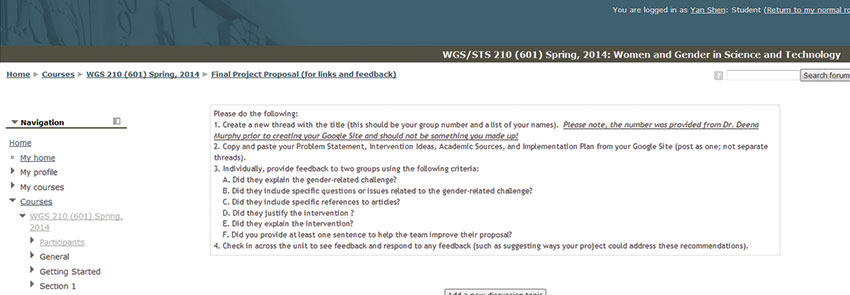
Scaffolding Service Learning Inquiry in WGS/STS 210
DELTA staff collaborated with Dr. Deena Murphy, instructor in Interdisciplinary Studies, to redesign the service learning project in WGS 210: Women and Gender in Science and Technology, which is a distance education General Education Program (GEP) course at NC State. Prior to the redesign, Dr. Murphy worked with DELTA to convert the face-to-face version of this course to a new distance education course, which was first offered in Spring 2010. Since then, the enrollment cap has increased to 150 students per online section. The purpose of the redesign is to promote higher-order thinking and experiential learning through the service learning project as well as to facilitate group collaboration and cross-group interactions in an online learning environment.
Instructional Challenges
-
Scaffold higher-order thinking during a semester-long service learning project in a distance education course with a large number of students.
-
Increase small group collaboration and across group interactions within the large course structure to create an online learning community.
-
Effectively manage and assess student projects in the large online course.
Highlights and Solutions
Google Site Template: Designed to scaffold problem solving and reflection during the service learning project. Groups used the template to create their own project website and followed the scaffolds in the template to complete the project. Scaffolding support included:
-
Inquiry steps and tasks for identifying a gender-related challenge, generating intervention ideas, developing the implementation plan, and reflecting on the implemented intervention.
-
Collaboration prompts embedded in the inquiry tasks to suggest when and how to work together as a team.
-
Modeling examples of existing gender-related challenges, a well-defined problem statement, intervention ideas and investigation questions.
Peer Review Activity: Designed to help groups improve their project proposal by interacting with peers. Students individually reviewed two other groups’ proposals shared in the Moodle forum and provided feedback based on given criteria aligned with the rubric and learning objectives. Groups were required to respond back to peers by suggesting how they would address the feedback.
Project Information Form: A Google Form created for the instructor to collect and manage the groups’ service learning project information, including group name, group members’ names, project title, Google Site link, etc.
Peer Evaluation Form: A Google Form created for the students to evaluate individual group member’s performance during the service learning project, such as contributions to discussion, quality of work, cooperative attitude, time management, etc.
Evaluation Summary: DELTA staff evaluated the effectiveness of the Google Site template and cross-group peer interactions with the support of Dr. Murphy during the Spring 2014 semester. We conducted a student survey at the end of the proposal stage and collected Moodle discussion forum analytics. There was a 67% response rate to the survey with 89 of 137 students responding.
Read more detailed evaluation results in the Spring 2014 WGS 210 Proposal Survey Findings report.
For more information about DELTA services, please contact LearnTech.